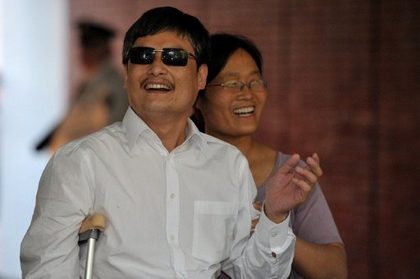SUMMARY
This is AI generated summarization, which may have errors. For context, always refer to the full article.

NEW YORK, United States of America (AFP) – Chen Guangcheng, the blind Chinese activist whose flight to the US embassy in Beijing sparked a major diplomatic incident, said Thursday, May 31, that democratic change in China is slow, but irreversible.
“I’m very optimistic,” Chen said. “Nobody can stop the process of history, whether it’s the central government, whether the central government wants to move forward or backwards.”
In his first major public appearance since being allowed to leave China to study at New York University, Chen told the Council on Foreign Relations think tank that the Internet age meant the communist state machine had already lost much of its grip.
“Chinese society has gotten to the era where if you don’t want something known, you better not do it. People are using all kinds of means to disseminate information. Can you do cover-ups? No. That possibility is diminishing,” he said.
Countering the frequent argument that China, with its different culture and history, should not copy Western-style democracy, Chen cited the examples of Japan, South Korea, and Taiwan, and said: “We also need to learn eastern democracy.”
But activists at home and Western powers watching from the outside should not force China, he said.
“Many people, they want to move that mountain in one week. That’s not realistic. We have to move it bit by bit and move it by ourselves.”
According to Chen, the central government in Beijing is moving in the right direction, but local authorities, such as the officials who harassed him and he says are still persecuting his family, are acting lawlessly.
“The central government is letting me come to the US to study. That is unprecedented, regardless of what they did in the past. As long as they move in the right direction, we should affirm it, rather than… (be) challenging everything,” he said.
The central government is ready to reform, “but I think local authorities are very backward and it’s going to take time to change them,” he said. If local authorities are not forced to respect China’s laws, then the central powers will “lose control,” he warned.
Chen was sentenced to more than four years in prison in 2006 after exposing abuses in China’s one-child policy, and then placed under house arrest upon his release in September 2010.
The 40-year-old activist’s escape from house arrest and his dramatic arrival at the US embassy in Beijing last month highlighted China’s long-criticized human rights record.
Though he was eventually allowed to move to the United States, Chen once again insisted Thursday that he is not seeking political asylum and that he intends to return home.
For now, though, one of his main goals is simple: to get a few days off.
“For the last seven years I haven’t had a weekend, so both for my body and mental health I need some rest,” he told the packed audience at the Council on Foreign Relations.
Aside from studying at NYU, Chen said he hopes to become involved in reforms underway of New York’s laws on protection of disabled people. “I’d love to be involved in that process,” he said.
This was Chen’s first extended interaction with the public, fielding questions from lawyers, human rights activists and scholars.
Earlier this week, he penned an op-ed in The New York Times where he blasted what he said was the failure of Chinese authorities to respect the country’s own laws.
He cited the harrowing story of his escape and what he said was a retribution raid by “a furious pack of thugs” against his nephew, who was badly beaten, before being arrested for defending himself with a knife.
“China’s political stability may depend on its ability to develop the rule of law in a system where it barely exists,” he wrote. “China stands at a critical juncture.” – Sebastian Smith, Agence France-Presse
Add a comment
How does this make you feel?
There are no comments yet. Add your comment to start the conversation.